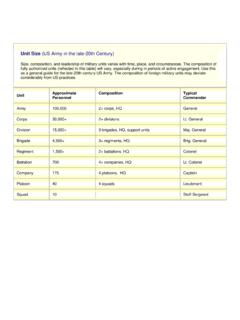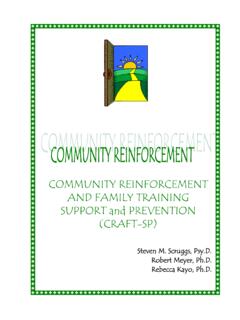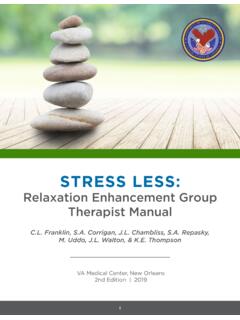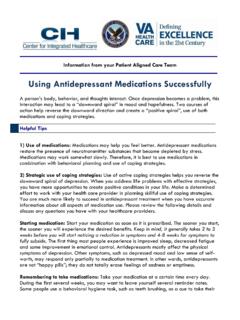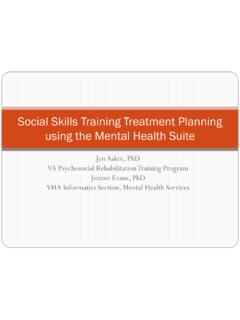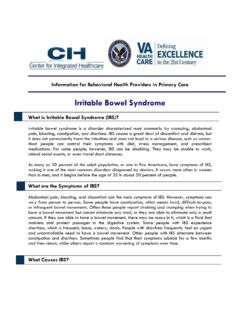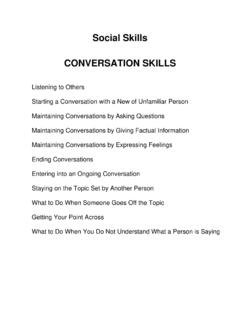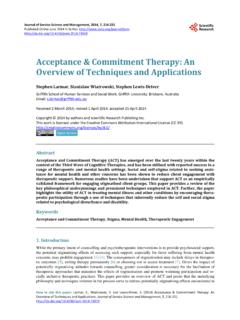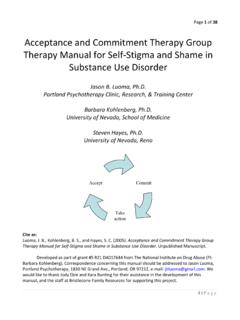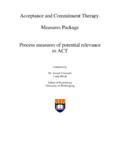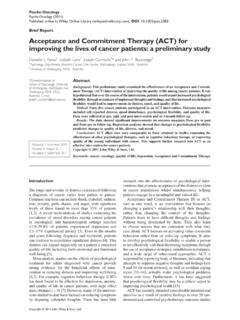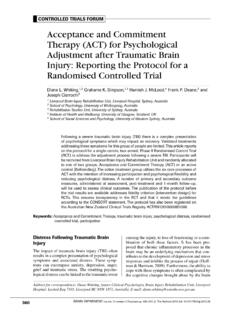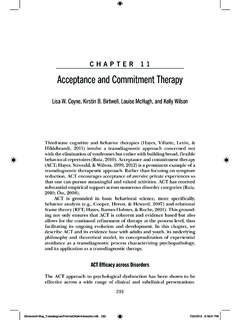Transcription of Acceptance and Commitment Therapy for PTSD …
1 Acceptance and Commitment Therapy for PTSD Veteran Manual Regan Settles, Beth Morris, Kristi Bratkovich, Acknowledgements Portions of this manual were adapted from or influenced by the following sources: Follette, , & Pistorello, J. (2007). Finding Life Beyond Trauma: Using A cceptance and Commitment Therapy to Heal Post-Traumatic Stress and Trauma-Related Problems. Oakland, CA: New Harbinger Publications. Harris, R. (2009). A CT Made Simple: A n easy-to-read Primer on Acceptance and Commitment Therapy . Oakland, CA: New Harbinger Publications. Hayes, S. C., Strosahl, K.
2 D., & Wilson, K. G. (1999). A cceptance and Commitment Therapy : an experiential approach to behavior change. New York: Guilford Press. Hayes, S. C., & Strosahl, K. D. (Eds.). (2005). A practical guide to Acceptance and Commitment Therapy . New York: Springer Science. Hayes, , & Smith, S. (2005) Get of Y our Mind and Into your Life. Oakland, CA: New Harbinger. Juariscio, A., Shaw, J., Forman, E., Timko, , Herbert, J., Butryn, M., & Lowe, M. (2010) The WE-ACT Group: Weight and Eating Applications of Acceptance -Based Treatments. Unpublished Manual. Kabat-Zinn, J. (1994). W herever you go, there you are: Mindfulness Meditation in Everyday Life. New York: Hyperion.
3 Stahl, B., & Goldstein, E. (2010). A Mindfulness-Based Stress Reduction Workbook. Oakland, CA: New Harbinger. Walser, & Westrup, D. (2007). A cceptance and Commitment Therapy for the Treatment of Post Traumatic Stress Disorder and Trauma-related Problems. Oakland, CA: New Harbinger Publications. Portions of session 10 were also adapted from sources on Dr. Russ Harris website: The authors would also like to thank Chase Bailey, for his assistance early versions of this manual. This work was supported by a clinical educator grant from the VA South Central Mental Illness Research, Education and Clinical Center (MIRECC) 3 Group Guidelines Confidentiality Everything you discuss in group is confidential with two exceptions: (1) If you report any plans to hurt yourself or someone else and (2) If you report any abuse.
4 In both of these cases, group leaders are legally required to break your confidentiality to protect you and/or others While your group leaders are bound to confidentiality, group members are not. By participating in this group, we ask you to keep this a safe space by keeping everything that your fellow group members discuss private. Respect We are all unique people and will have different points of view. Please respect others who think differently than you do. Please also respect that people process their trauma at different paces. Be on time We have a lot to discuss in this group! If you are more than five minutes late, please enter quietly to avoid disruption.
5 Please also be aware that we may not be able to catch you up on missed content. Missing sessions If you miss more than two weeks of the group, we will ask you to discontinue and start again during another group. This is because missing more than two sessions will result in you not receiving adequate exposure to the group content. Staying on Topic Most people have numerous problems going on in their lives. While we view all of this as important, our focus in this group is on posttraumatic stress symptoms. If we redirect you during group, it is not because what you are saying is wrong. Instead, it is because we have limited time and want to make sure that we focus on the purpose of the group.
6 You may also bring something up that is on topic and important, but that we cannot fully address as a group. In these instances, you may asked to address the topic with an individual therapist or group leader outside of the group session. Homework If you only come to group and do nothing in between sessions, this group will have limited effectiveness. For this reason, we will be giving you weekly assignments to complete between sessions. This homework serves two purposes. First, it helps you apply the things you are learning in group to your specific struggles. Second, it gives you experience using the group material in the real world. If you are struggling with any of the assignments, please bring this up to group leaders as soon as possible so that we can help you identify and overcome barriers.
7 Open-mindedness During this group we will ask you to think in new ways and at times participate in activities that seem different to you. It is normal to feel confused at times or wonder if this will be helpful to you. Please keep an open mind throughout the group. 4 Session 1 Overview What is ACT The overall idea of Acceptance and Commitment Therapy , or ACT, is that trying to avoid the pain of PTSD comes at a cost: that cost is the ability to really engage in a life that is meaningful to YOU. The core idea of this group is that we can learn new ways to live with pain, while making more room for the important things in our lives.
8 Goals of the Group Overcome the pull to avoid your painful memories and anxiety Learn skills to help you live a life that matters to you, despite the presence of PTSD Learn skills to relate to your trauma a new way, so it has less power over your actions Pain of Presence and Absence Pain is inevitable and unavoidable. We can think of the inevitable presence of pain in life as clean pain. When we put a lot of focus and effort into avoiding or getting rid of the pain of presence, we can miss out on important things in life. This is the pain of absence, which can be thought of as dirty pain or avoidable pain. By reducing the pain of absence, ACT helps us reconnect with what we find most meaningful and important.
9 Tug- of- War Monster Activity: My Take Home Points 5 Session 1: The Pain of PTSD Worksheet Column 1: What are the sources of my PTSD Pain? ( clean pain ) Column 2: How have I have tried to get rid of PTSD pain? Column 3: What am I missing out on when I do that? How does this interfere with the life I want? ( dirty pain ) Common sources of PTSD Pain: Common ways we try to get rid of PTSD Pain: Feelings ( , anxiety, anger) Distraction ( , videogames, working overtime) Sensations ( , shaky, tense) Withdrawing or giving up ( , isolating, stopping activities) Urges ( , to leave a crowded place, to use substances) Thinking ( , ruminating, dwelling on, fantasizing, blaming) Thoughts ( , about the trauma) Memories ( , of what happened) Numbing ( , with substances, self-harm, recklessness) Images/Sounds Controlling ( , only sitting in a particular place, always being the driver)
10 Avoiding people, places, things Constantly checking for danger 6 Session 1 Home work Finish completing your Pain of PTSD worksheet. Consider bigger sources of pain that you struggle with as well as day to day things that come up for you. See if you can identify any patterns in how you tend to try to get rid of pain/anxiety, and assess the potential personal cost of those efforts. Complete the PTSD Beliefs and Behaviors worksheet. Use the completed example as a guide. 7 Session 1 Homework: PTSD Beliefs and Behaviors Worksheet Directions: PTSD can impact how we think about things (our beliefs) and what we do (our behaviors).
